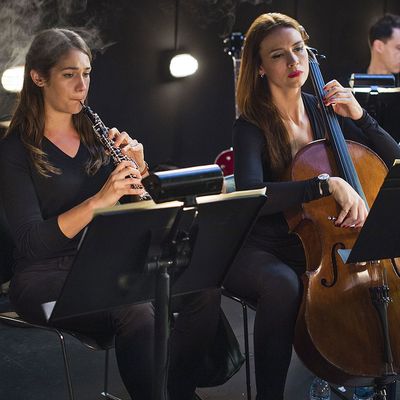
When Mozart in the Jungle made its debut in 2014, I watched the first episode with narrowed eyes and jaded ears. How, I wondered, could a TV show possibly get the classical-music world right and still be fun? You’d have a hard time finding a potentially duller comedic backdrop, or one more prone to being mangled, than a symphony orchestra. I expected a cascade of clichés and prejudices: a maestro with no sense of rhythm who waves his arms as if washing an invisible car, audiences of stiffs and snobs, perhaps a new symphony that launches the composer into a life of nightly standing ovations and perpetual Champagne on tap. Three seasons later, I’m not just sold; I’m consumed with admiration for a show that features the disorganized, bike-riding maestro Rodrigo (Gael García Bernal), the hardworking but perpetually insecure oboist Hailey (Lola Kirke), and the orchestra’s corps of jaded idealists. The music serves as more than just the show’s ornamental backdrop or soundtrack conceit; it’s a principal character — an unpredictable romantic who always knows how to express what others only think and feel.
If a show can be in love with its subject matter, Mozart in the Jungle has fallen for the strange, motley power of music. Consider this season’s eighth episode, which is structured as a fake documentary about, of all improbable comic devices, a jailhouse Messiaen gig. In order to shoot the segment, a real orchestra and its actor-filled double traveled to Rikers Island and performed for actual detainees, who were genuinely overwhelmed (and said so on camera). What they heard was not a concert of easily digestible pops, but a program of music by the 20th-century French composer Olivier Messiaen, who wrote one his best-known works, Quartet for the End of Time, in a World War II prison camp. Inmate to inmate, composer and audience connected across continents and decades. In the episode, Messiaen’s ecstatic percussion, the bell-like chords, and the eerie electronic cry of the ondes Martenot go gliding over the concertina perimeter toward the East River and the Manhattan skyline. I hope the next time an orchestra administrator claims that the surest way to win new audiences is by spoon-feeding them pabulum, someone will cue up the moist eyes of inmates listening to Turangalila-symphonie.
Mozart in the Jungle gets its energy from the characters’ sincerity: No matter how much they shout down, double-deal, and betray each other, they are bound by their shared passion for music. Dramas about such people tend to stick to a few familiar tropes: the big break, the blown audition, the second chance, the spotlight on the big stage, the standing ovation. Mozart in the Jungle toys with them all, but filters them through reality. The big break turns out to be a dud, and audition letdowns don’t miraculously reverse themselves. For Hailey, success comes in tentative dribbles, notably a self-funded concert in a pop-up venue in Gowanus, with an audience numbered in the dozens. That whole episode is a loving ode to New York’s new-music scene. Hailey, who has taken her first steps towards becoming a conductor, leads the world premiere of a work by the hilariously meddlesome, self-doubting composer Thomas Pembridge (Malcolm MacDowell). The real-life composer Missy Mazzoli wrote the score, a magically weightless chamber violin concerto that emerges out of last-minute rewrites and pre-curtain chaos.
I have observed young musicians learning to conduct — I’ve even taken a crack at it myself — and the show gets the process improbably right. True, an orchestral musician as experienced as Hailey would probably have an easier time with the basic gesture patterns, and more confidence locating the downbeat. But the real violin virtuoso Joshua Bell tells the fictional Hailey that if she has clear musical ideas, it doesn’t really matter how she gets them across. And it’s true: One of the mysteries of conducting is that vague technique can still achieve superb musical results. But you do have to understand musicians, as well as music. In one touching scene, Rodrigo helps Hailey lead an imaginary orchestra in the performance of Sibelius’s Fifth Symphony that’s running through her head. As they listen together to the silent music, he leaves the pretend podium and joins the absent musicians, conjuring each one’s strengths and foibles. “He’s always rushing a little bit, but it’s out of joy, out of love for the music.” He’s talking about a flautist, but he could be describing the whole show.





